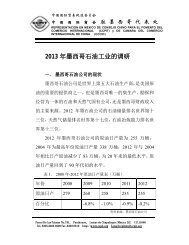You also want an ePaper? Increase the reach of your titles
YUMPU automatically turns print PDFs into web optimized ePapers that Google loves.
Regional Trade & Investment<br />
By Lesley Cui<br />
LATIN AMERICA<br />
Chinese Tech Giants Eye Brazil<br />
Big Chinese consumer-technology companies<br />
are dominant at home, but they have<br />
struggled overseas. Now, in an attempt to<br />
change that, they are charging into Brazil<br />
and other emerging markets, according to a Wall<br />
Street Journal report.<br />
Foray into the rising market<br />
The Chinese like emerging markets because,<br />
for a change, they don’t have to start way behind<br />
established American companies. By moving into<br />
Brazil aggressively, Chinese PC maker Lenovo<br />
and Internet-search company Baidu hope to gain<br />
an edge over companies like Hewlett-Packard and<br />
Google. In addition, some U.S. companies that are<br />
leaders at home and in Europe have a smaller footprint<br />
here because of Brazil’s long history of protectionism<br />
and red tape and its high cost of labor,<br />
particularly compared with Asia.<br />
Chinese and U.S. companies agree that the<br />
Brazilian market is increasingly important. While<br />
its middle class is growing, it is already big enough<br />
to make overcoming Brazil’s high cost of doing<br />
business worthwhile.<br />
Lenovo, the world’s No. 2 PC vendor, says it<br />
expects more than 20% of the next half-billion PC<br />
buyers to be in Brazil. The company, which surpassed<br />
Dell in part because of a push into markets<br />
including India and Russia, says its Brazil operation<br />
is now its biggest outside of China.<br />
Brazil always has had a large population, and<br />
now, with the growth in its middle class, “this population<br />
has more consumption power,” says Silvia<br />
Quintanilha, vice president of client services at the<br />
research firm Millward Brown in São Paulo. “All<br />
of the brands are looking at us now. All of them are<br />
arriving in Brazil.”<br />
Brazil is “the most important” market outside<br />
of China, says Jonathan Dillon, head of Baidu’s international<br />
business, which is also launching more<br />
services in Thailand and Egypt. Brazil is “a highgrowth<br />
economy in general, has a high-growth<br />
Internet, and we think that some of the big global<br />
players haven’t given as much localized attention to<br />
the market,” he says. “There’s a good opportunity<br />
for us to come in.”<br />
According to a recent survey by its central<br />
bank, Brazil’s gross domestic product is expected to<br />
grow 3.3% in 2013, after a dip to an estimated 1%<br />
last year.<br />
Not easy expansion<br />
But it may not be easy for Chinese companies,<br />
which continue to struggle to build their brands outside<br />
China. Baidu has had limited success offering<br />
its service in Japan. And while Google has lost some<br />
traffic in Brazil to new rivals, the company still dominates<br />
the Internet sector across several categories and<br />
is familiar to Brazilian users. Lenovo is seeing high<br />
growth in emerging markets and in global PC sales,<br />
but it hasn’t performed as well in the U.S. against<br />
such familiar brands as H-P, Apple and Dell.<br />
68

















